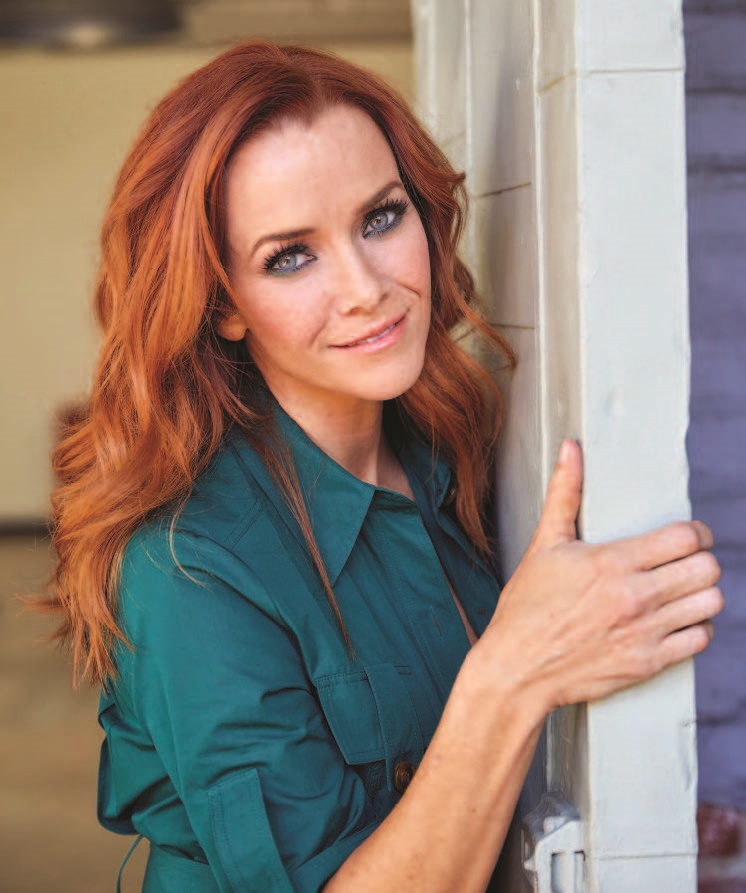Not all show business beauties are what they seem. Take Annie Wersching. For more than a decade, TV audiences have been drawn to her appealing, girl next- door good looks only to discover that the people she plays tend to have a mean streak that, well, you wouldn’t want living next door. That may also explain why Wersching a) is one of the most in demand actresses on television, and b) is having so much fun. As Renee Walker on 24, Emma Whitmore on Timeless and now Leslie Dean on Marvel’s Runaways, Wersching has demonstrated a particular talent for taking her characters to the next level in the most entertaining and unexpected ways. Mark Stewart talked to her about the finer points of being a Hollywood star and a Hollywood mom—yet another challenging role she can claim to have mastered.
EDGE: So, congratulations on becoming part of the Marvel Universe.
AW: It’s been crazy [laughs]. It’s not just how they deal with their shows and their actors—it’s certainly more secretive, and there are more rules—but it’s fun to see how they’ve taken the Runaways comic and changed it for television. And how they are pleasing the hardcore fans, yet keeping things unpredictable. I’ve never played someone like my character, Leslie Dean. She’s quite a trip.
EDGE: She seems a bit unhinged.
AW: Yes, but in a very put-together way. She’s the head of this big celebrity church in Los Angeles, and she harbors a lot of secrets. There’s a lot of crazy, cringe-worthy stuff she has to do. Stuff that, to look at her, you wouldn’t expect from the way she presents herself. It’s a big ensemble cast, so in some episodes I have a lot to do and in others not so much. There’s actually been a learning curve for me getting used to that.
EDGE: On your previous series, Timeless, you played a time-traveling assassin. That was a very complex character. A lot of fans were anxious for Timeless to be renewed for a third season because Emma was about to become the leader of Rittenhouse, the bad guys in the show. At least there is a wrap-up TV movie on the way.
AW: Emma was following what she believed the overall Rittenhouse plan was but, yes, she was going to run the show now. It would have been really fun, because she was a little “spontaneous” shall we say.
EDGE: I’ve always been curious about an aspect of movies and TV shows that deal with time travel. Since it doesn’t exist, that means the writers have to establish some basic do’s and don’ts and then weave them into the plots. You also tend to bump up against some logic issues. Was this a constant discussion on Timeless?
AW: Oh, my gosh. Yes. In terms of the science of time travel, there were rules on the show. I would have loved to have been a fly on the wall in the writers’ room to see how in the world they figured out the exact rules we were going to follow.
EDGE: For your character in particular.
AW: Right. When we first find Emma, she has been spending ten or eleven years in the past. But in the present storyline, it’s only been about six months or something. So I would ask, Wait, how old am I? Am I aging? If I go back to the present-day storyline, would I look ten years older? There were so many things like that I’d ask questions about. I have no idea how they kept it all straight, but they had it down. No-no-no…this should be this, and that should be that, and you can’t go back to a time you’ve been in before…I was pretty good at science in school, but when it comes to the TV version of time-travel science, I was like, Yeah, somebody just tell me what makes sense.
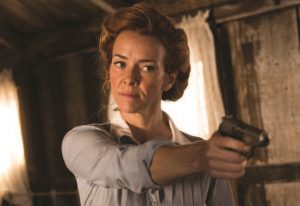
NBC/MiddKid Productions
EDGE: Was Emma’s story arc laid out for you, or did it unfold script by script?
AW: It was one hundred percent script-by-script.
EDGE: So, as an actor, how do you dig in and understand her purpose and motivation?
AW: It was very tricky. Especially in her first episode. It wasn’t even revealed to me at that point that she was a mole or a bad guy or with Rittenhouse or any of that. Looking back, I think fans saw little smirks and things that they read into her, but at the time, I had no idea how the plot would twist at the end of the season. I knew there were secrets that she had, for sure, but I didn’t know exactly how big they were. A lot of actors write journals and go really in-depth into backstories so they can flesh out a character in their mind. But that’s hard for me in television, because if I make up this whole story and the script comes for the next episode and it contradicts what I made up in my head, that just complicates things for me. So unless I have a really big, serious question—something that doesn’t make sense to me in the episode—I tend to go with what I have on the page from the writers and try to give the characters some humanity and vulnerability and go from there.
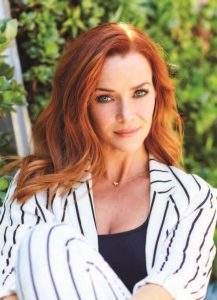
Photo by Jonathan Weiner
EDGE: You had worked with Goran Visnjic before Timeless.
AW: Yes. He played Garcia Flynn in the series. We had done the Halle Berry series Extant together. Goran and I already had a nice rapport, which was good because Emma and Flynn had a fun little chemistry. I hadn’t worked with any of the other cast members, but I had seen Abby [Abigail Spencer] in Rectify. It was fascinating to watch her work. Everybody works differently. Some people have everything planned out when they come in. She would come in and have a lot of questions. But when they said Action, she was just so one hundred percent present and could tap into different emotions so amazingly. It was just so cool to watch her work. I would forget my lines just watching her in awe.
EDGE: On 24, you played Renee Walker, more of a good guy role, at least on the surface. Do you have more fun playing good guys or bad guys?
AW: I absolutely adored playing Renee. Any character that has a switch or change is fun to play. Renee was a good guy, essentially, and Emma was essentially a bad guy. But Renee started as a rules-follower then slowly but surely went over to the dark side after spending some time with Jack Bauer. Emma was very committed to the rules she was going to follow. She spent all those years back in the past to prove herself to Rittenhouse. So both were very committed.
EDGE: How much Annie Wersching was there in Renee Walker?
AW: There is a little bit of me in every character I play. As far as her being a bad-ass, I really enjoyed playing that portion of Renee. I also loved fleshing out her physical aspect. I was a dancer growing up.
EDGE: Did her use of torture bother you or make you squeamish?
AW: Oh, no. I was like, Yes! Not that I agree with torture, but I like anything that makes the audience go Holy crap! That’s always fun to play. And again, it was something that deviated from what she had always been like. It was super fun.
EDGE: Is it an advantage or a disadvantage of joining an established series like 24, which was already six seasons in?
AW: A bit of both. It’s nice to go into a show that’s already a well-oiled machine. I came on in Season Seven, and there had been some negative stuff said about Season Six, so there was a lot to prove. In terms of someone who had to go toe-to-toe with Jack, who had a lot of fans in the audience, that’s always a risky thing. But as soon as I saw how they were writing Renee and the fan response to her, I couldn’t have been more excited. Especially when she started to kind of become the female Jack Bauer. That was huge in terms of winning people over.
EDGE: Did they let you know from the start that you would become a love interest for Kiefer Sutherland’s character?
AW: I didn’t really know that. They wanted Renee and Jack to go toe-to-toe, professionally. Of course, they wanted there to be sparks. Actually, the second I learned about them finally getting together, my first thought was Oh. No. That’s the end of her.
EDGE: Any feelings about Russian meddling?
AW: Oh, I know! I spent all that time undercover with the Russians in that second season! When I’d see that stuff in the script, I’d say, No, that’s too much. This isn’t believable. No way. Let’s stick to real life. Cut to ten years later, and it’s…real life. Terrifying!
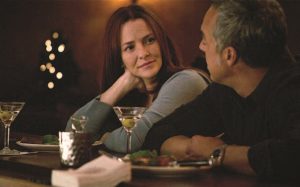
Amazon Video
EDGE: In the Amazon series Bosch, you played against Titus Welliver. His character, Harry, was also very dark— like Flynn and Bauer. Does that rub off on you after a while?
AW: Definitely. But in Bosch, my character was such a newbie, always messing up. The two of them together— the hardened professional veteran with this rookie—I thought it was a cool dichotomy. I love Titus. We got along fine. We had a really good time.
EDGE: Which male lead has brought out the best in you?
AW: I’ve been really lucky in that department. I played against Kiefer so long I learned a tremendous amount from him. Titus is definitely up there. And I really loved working with Goran in two different shows as two different sets of characters. I feel I’m good at observing and absorbing the good things from these dynamics. I’m a bit of a sponge.
EDGE: You mentioned dancing. Was that how you got your start as a performer?
AW: It was. In fourth grade, I started doing plays and musicals in school and continued into junior high school and high school and then into college. I don’t recall a moment where I thought, This is what I have to do! It was just kind of what I did. But yes, I started with dance. Tap, jazz, ballet, and Irish dancing—which I think was where I had my first experience in terms of stage presence. In the Irish dancing community at that time, everybody was very, very serious. No one ever smiled. It was very rigid. Nowadays, it’s happier, and there is more of an entertaining factor to it. But back then, I was literally known as “The girl that smiles.” If you go back and look at stories from my competitions, they would always mention that. From a competitive standpoint, I have a lot from that experience, in terms of finding a way to stand out. That really helped when I transitioned into plays and musicals.
EDGE: What were your plans after college?
AW: I was a musical theater major, and I’d always planned to go to New York. I went to Chicago briefly after school and ended up touring with a musical that closed in Los Angeles. So I thought, Let me check this L.A. thing out. One of the first things I witnessed was, as a member of a live audience, a taping of Stark Raving Mad, the sitcom with Neil Patrick Harris and Tony Shalhoub. I thought, This is the best of both worlds—they are performing like it’s theater with the audience interaction, but you are on TV—this is the dream. I never went to New York. I returned to Chicago, packed up my stuff, and moved to L.A.
EDGE: What were you doing to develop your skills in your 20s?
AW: Gosh, I was doing it all. Early on, I did a couple of musicals at the Pasadena Playhouse. I was doing commercials. I did extra work. I didn’t take many classes—probably because I didn’t have any money. I booked a pretty good guest star on Star Trek Enterprise. That was fascinating. I remember learning a lot from that group. Then I slowly started booking co-stars with a couple of lines, and then guest stars, then the “recurs”— it’s like this ladder you have to climb. Once I became more of a woman as opposed to a girl, I think it matched up more with how I carry myself, and also my voice. Things changed when I started auditioning for the woman in the show and not the chipper girl in the show. It meshed better with my personality…although I am pretty chipper.
EDGE: After all these years working in television, are you ever tempted to get back on the stage in a play or a musical?
AW: Oh, yeah! I’ve been thinking about it for years, but it’s hard to time it with the television world. It would have to be in the hiatus from whatever show I’m on. But I’d absolutely love that.
EDGE: Did you model yourself after a particular actress when you were younger?
AW: No, not really. Growing up, the posters on my wall were Marilyn Monroe and [laughs] Brad Pitt. Not that I wanted to be like Marilyn, but I was obsessed with her transformation from Norma Jean. Also, I always loved Michelle Pfeiffer and Julianne Moore and Diane Lane. Women who were women, who had a lot of gravitas in their roles.
EDGE: On your résumé is a stint on the daytime drama General Hospital. I am friendly with actors who tell wild stories about knocking those shows out day after day.
AW: I was on General Hospital for about five months, and it was totally insane. I had never done anything like it. It was incredibly exciting. Also, it was the first time my mom and the people back home could see me on TV every day of the week. It was definitely a big deal for me. I left t h e show for a couple of weeks to shoot the pilot for 24, which was my first big pilot booking. Darby Stanchfield played my role for those two weeks, and then I came back. At that point, they were interested in signing me to a four-year contract. I was wavering on whether or not to sign for a long time. It’s a commitment. I think we shot fifty pages a day. On 24 or Runaways or Timeless, we might shoot six to eight pages of dialogue a day. It was intense. I mean, unless you’re falling down bleeding, they’ re moving on—just get the words out and go to the next scene. It was great training, and it forces you to make a choice because you don’t have another take to try something different. You have to really know what your character wants s and what you want to accomplish in that scene. It helped me become more concise and also I learned pretty quickly that I was good at the memorization part of it. It was a lot of work…I don’t think the regulars who are on the show get anywhere near the credit they deserve.
EDGE: You are expecting your third child at the same time you are shooting Season Two of Runaways. Is this the first time you’ve been in this situation? Are you at the point where they need to start hiding you behind things?
AW: I think we’re just about to hit that part…and yes, it’s a first for me. I wouldn’t say that it’s been fun. At the very beginning, I was actually terrified to tell them—Oh, God I’m going to ruin the show, Leslie is going to be chubby this season—there are so many aspects of that, just from a vanity standpoint. There are so many things that go through your head. My character wears all white and, in the beginning, I was having morning sickness like crazy, so I was dealing with that. But it’s fine.
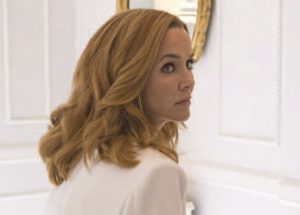
HULU/ABC Signature Studios
EDGE: You and your husband [actor Stephen Full] are raising a family while working full-time in the business. How do you pull that off?
AW: It’s not super easy, but it’s certainly nice that we both“ get it. ” We both understand what it’s like to be in the midst of a crazy shoot. We’ve been incredibly lucky that our careers have balanced each other in amazing ways. The couple of times we were both series regulars we didn’t have kids yet, so we were living the dream. Now, like, tomorrow, both of us are filming and for the life of me, I cannot find a babysitter. So I’m like, Okay I guess my son will just have to come to the trailer with me. I feel like we’re always scrambling to figure it out. But I think we’re doing a good job keeping things normal for them. We’re Both pretty grounded.
EDGE: What presents the biggest challenge?
AW: We’ve been lucky in not having to work out of town too long. That’s where it becomes really hard when you’re on location. The Vampire Diaries shot in Atlanta and I was gone quite a bit for that. I had the little one with me, but I missed my older boy’s first day of kindergarten. You know, stuff that’s never going to happen again. It’s inevitable that you’re going to miss some of those moments. That’s rough. Timeless shot in Vancouver, but at least that was in the same timezone as California, so you can talk to your kid before bedtime. Sometimes it’s these little things that make a big difference.
Editor’s Note: Annie Wershing’s third child was due as this issue went to press. Although NBC canceled Timeless after Season Two, the network shot a two-hour “wrap-up” TV movie, which it plans to air in December.

